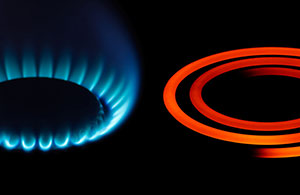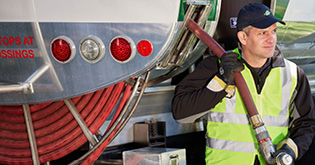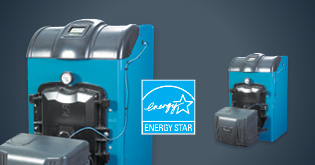- My Account:
- Sign In
- Register
- Make Payment
Propane vs. electric.

Propane is more economical and more efficient than electric - that's a fact!
Virtually anything in your house, restaurant or building that can run on electricity can run on propane. However, a propane-fueled home is less costly to operate than an electric home. The costs of electricity and propane can be compared using the BTU (British Thermal Unit), which measures the heating value of each fuel. National fuel prices from the U.S. Department of Energy show that the cost of electricity is more than twice the cost of propane.
Compared with electric heat, propane is better in so many ways:
- Propane is cheaper than electric:According to the U.S. Department of Energy, heating a home in the U.S. with propane in recent years has cost far less than heating with electricity. In addition, over time, propane water heaters can cost one-third less to operate and recover water twice as quickly as electric water heaters.
- Propane is warmer than electric:A propane gas furnace heats air to about 130°F to 140°F and operates in short intervals to minimize operating costs. An electric heat pump produces heat below body temperature (98.6°F), so the air actually feels cool when placing your hand in front of a vent.
- Propane furnaces last longer than electric heat pumps:Propane-fueled furnaces last 5 to 10 years longer than electric heat pumps, on average.
- Propane is more dependable than electric: Propane can be stored safely in a tank on your property, while electricity is subject to power outages. Reliable propane works when and where other energy sources don't - which makes it quite versatile.
- Propane is clean: Propane has long been recognized as the "green" energy. By using this exceptional energy, homeowners can help cut emissions and protect the environment. Propane is an approved alternative fuel listed in both the Clean Air Act of 1990 and the National Energy Policy Act of 1992. Moreover, because it is released as a gas, propane doesn't spill, pool, or leave a residue.
- Propane is safe: Propane has quite a remarkable safety record, due in large part to the stringent codes and regulations developed by the propane industry and the National Fire Protection Association (NFPA). Propane also has built-in safety properties: It won't ignite when combined with air unless the source of ignition reaches 940°F. Propane gas is nontoxic and produces minimal emissions, and is not harmful to soil or water. With propane, what you see is what you get. While electricity is measured in hard-to-understand "kilowatt hours," propane is measured in familiar "gallons."
- Propane is customer-friendly: With propane, you get 24/7 customer service and support from your local Region Energy team, - who all live and work where you do - not from the big power companies.
For the same heating value, propane offers remarkable savings and benefits over electricity, even when you break it down by appliance:
Propane gas furnaces
- Consistently supply air at 120°F. Electric heat pumps dispense 95°F air, which is less than body temperature (98.6°F), so the air feels cool, not warm.
- Last an average of 20 years, while electric heat pumps last an average of 12 years.
- Have lower repair costs than electric heat pumps
Propane gas water heaters
- Cost approximately $10 less per month to operate than comparable electric units
- On average are 42% less expensive than electric heaters. Over an average life span, they can save homeowners nearly $2,000 more than an electric unit
- Heat more than twice as much water in an hour as comparable electric models
Propane gas-burning fireplaces
- Cost between 30% and 60% less per hour of operation than wood-burning fireplaces
- Emit 40 times fewer emissions than wood-burning units and cost less to operate
- They can be turned off easily with a switch, eliminating concern about remaining embers
Propane gas-burning cooktops and ovens
- Offer instant heat and absolute temperature control — 97% of professional chefs prefer cooking with gas
- Propane gas clothes dryers
- Can complete drying tasks in approximately three-quarters of the time it takes an electric unit
- Some models save up to 65% in costs over electric dryers
Start saving on your electric bills and switch to propane today!
Learn more about why choosing propane as a fuel source for your home is a smart choice



.jpg?sfvrsn=ba81b4e4_1)
.jpg?sfvrsn=43a0195a_3)